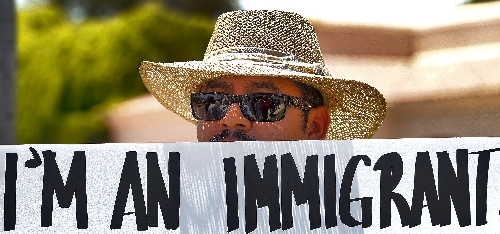Split vote on Arizona border law
WASHINGTON - The Supreme Court struck down much of Arizona's first-of-its-kind crackdown on illegal immigrants, ruling that states must defer to the federal government on immigration policy in an election-year victory for President Barack Obama.
The justices, voting 5-3, invalidated criminal restrictions that would have barred those in the United States illegally from seeking work or being in Arizona without proper documentation.
The court said a requirement that police check the immigration status of people they suspect are in the country illegally could take effect, while leaving open the possibility of later challenges.
The decision may undercut parts of similar laws in other states and will have repercussions for the November presidential election as Obama and Republican candidate Mitt Romney vie for Hispanic votes. Supporters of the law said the federal government isn't doing enough to crack down on an estimated 11.5 million people in the country illegally.
"Arizona may have understandable frustrations with the problems caused by illegal immigration while that process continues, but the state may not pursue policies that undermine federal law," Justice Anthony Kennedy wrote for the majority.
The court's decision landed in the middle of a presidential campaign in which Obama has been heavily courting Latino voters and Republican challenger Mitt Romney has been struggling to win Latino support. During a drawn-out primary campaign, Romney and the other GOP candidates mostly embraced a hard line on the estimated 11 million illegal immigrants, but Romney lately has taken a softer tone.
Obama said he was pleased that the court struck down key parts of Arizona's law but was concerned about what the high court left intact.
"No American should ever live under a cloud of suspicion just because of what they look like," the president said in a statement. He said police in Arizona should not enforce the provision in a way that undermines civil rights.
"What this decision makes unmistakably clear is that Congress must act on comprehensive immigration reform," Obama said.
"I will work with anyone in Congress who's willing to make progress on comprehensive immigration reform that addresses our economic needs and security needs, and upholds our tradition as a nation of laws and a nation of immigrants," he said.
In Scottsdale, Ariz., later Monday, Romney said he would have preferred that the court "give more latitude to the states" in immigration enforcement.
He told campaign donors that the law has "become a muddle" and that the states have more options to enforce their own immigration laws.
Earlier, he said in a statement, "I believe that each state has the duty - and the right - to secure our borders and preserve the rule of law, particularly when the federal government has failed to meet its responsibilities."
Romney said the ruling "underscores the need for a president who will lead on this critical issue and work in a bipartisan fashion to pursue an national immigration strategy."
The case bore similarities to the fight over Obama's health care law, with the administration clashing with Republican-controlled states.
As with health care, the argument pitted Solicitor General Donald Verrilli against former Solicitor General Paul Clement, arguing for the states. The high court is set to rule Thursday on the health care law.
The Arizona provision that will go into effect, known informally as the "show me your papers" requirement, instructs police officers to check immigration status when they arrest or stop someone and have "reasonable suspicion" that the person is in the United States illegally.
Kennedy suggested that provision would be invalid if it caused police to hold people longer than they otherwise would.
"Detaining individuals solely to verify their immigration status would raise constitutional concerns," he wrote.
Kennedy said it was too soon to determine whether that would be the consequence.
"There is a basic uncertainty about what the law means and how it will be enforced," he wrote.
He said the ruling "does not foreclose other pre-emption and constitutional challenges to the law as interpreted and applied after it goes into effect."
Chief Justice John Roberts and Justices Ruth Bader Ginsburg, Stephen Breyer and Sonia Sotomayor joined Kennedy in the majority.
The majority took some of the teeth out of the "show me your papers" provision by tossing parts of the law that would have given police officers more grounds to arrest people for immigration-related offenses. A third invalidated provision said police could arrest people they suspected were eligible to be deported.
Justices Antonin Scalia, Clarence Thomas and Samuel Alito each issued a partial dissent. Scalia and Thomas said they would have upheld the entire law, while Alito voted to back most of it.
"If securing its territory in this fashion is not within the power of Arizona, we should cease referring to it as a sovereign state," Scalia wrote.
He took the unusual step of reading a summary of his dissent from the bench.
Justice Elena Kagan didn't take part in the case because she played a role in the litigation as Obama's top Supreme Court lawyer before her 2010 appointment to the court.
Obama said earlier this month that his administration was halting deportation of some illegal immigrants who were brought to the United States as children and make them eligible for work permits.
Scalia took a shot at the president's description of the new program as "the right thing to do."
"Perhaps it is, though Arizona may not think so," Scalia wrote. "But to say, as the court does, that Arizona contradicts federal law by enforcing applications of the Immigration Act that the president declines to enforce boggles the mind."
The Obama administration sued to challenge SB 1070, as the Arizona law is known, saying it encroached on the exclusive federal right to set immigration policy.
The ruling is "a clear rebuke to Arizona and its attempt to create its own immigration law," said Omar Jadwat, an immigration attorney with the American Civil Liberties Union. The ruling means that "states really have very little room to operate in this area."
Arizona Gov. Jan Brewer called the ruling a victory for her state while saying the law was likely to face additional legal challenges.
"Our critics are already preparing new litigation tactics in response to their loss at the Supreme Court, and undoubtedly will allege inequities in the implementation of the law," she said.
Tom Sheahan, sheriff of Mohave County in northwest Arizona, called the ruling inconsequential.
"It really has no bearing on what we're doing," he said. "I've had a policy in place against racial profiling for at least 10 years."
Sheahan said the "show me your papers" provision of the law was not implemented when the law took effect because of the legal challenge.
He said most of his department's contacts with people in the country illegally are in traffic enforcement, and there usually are clear indicators of illegal status during such stops, such as lack of insurance or driver's licenses.
Republicans seized on the part of the law that the high court left intact and used the ruling to renew calls for tighter enforcement. Sens. John McCain and Jon Kyl, Arizona Republicans, said the ruling "appears to validate a key component" of the law.
"The Arizona law was born out of the state's frustration with the burdens that illegal immigration and continued drug smuggling impose on its schools, hospitals, criminal justice system and fragile desert environment," McCain and Kyl said in a statement.
Arizona's law was the first of its kind when enacted in 2010. Since then, Alabama, South Carolina, Georgia, Utah and Indiana have all passed their own measures aimed at illegal immigration. All are facing court fights.
The ruling "sends a yellow light to Arizona and other states that they have to be careful in enacting immigration law provisions," Stephen Yale-Loehr, who teaches immigration law at Cornell Law School, said in a telephone interview.
The case turned on the U.S. Immigration and Nationality Act, which says states may cooperate in enforcing federal law.
The administration contended Arizona went beyond cooperation and was trying to implement its own immigration policy of "maximum enforcement."
Special Review-Journal writer Dave Hawkins, based in Kingman, Ariz., contributed to this report, as did The Associated Press.





























